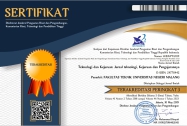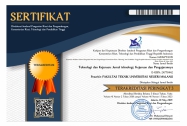Evaluation of the Dual Professional Function Transfer Program of the Cosmetology Study Program Against the Implementation of the KKNI (Indonesian National Qualification Curriculum)
Abstract
Keywords
Full Text:
PDFReferences
Andrée, M., & Hansson, L. (2021). Industry, science education, and teacher agency: A discourse analysis of teachers’ evaluations of industry-produced teaching resources. Science Education, 105(2), 353–383. https://doi.org/10.1002/sce.21607
Ayoo, S., & King, J. A. (2017). A Thematic Summary of Research Literature on the Teaching of Program Evaluation. Minneapolis, MN.
Bruns, B., & Luque, J. (2014). Great teachers: How to raise student learning in Latin America and the Caribbean. The World Bank.
Chang, S. H., Ward, P., & Goodway, J. D. (2020). The effect of a content knowledge teacher professional workshop on enacted pedagogical content knowledge and student learning in a throwing unit. Physical Education and Sport Pedagogy, 25(5), 493–508. https://doi.org/10.1080/17408989.2020.1743252
David, R., Teddlie, C., & Reynolds, D. (2000). The international handbook of school effectiveness research. Psychology Press.
Faisal, M., Tabrani, Z. A., Siswanto, R., Hayati, H., & Darojat, J. (2021). The Integration of KKNI, SNPT, and the Integration-Interconnection Paradigm in Curriculum Development at PTKI. Jurnal Ilmiah Peuradeun, 9(2), 309-328.
Gullickson, A. M., King, J. A., LaVelle, J. M., & Clinton, J. M. (2019). The current state of evaluator education: A situation analysis and call to action. Evaluation and program planning, 75, 20-30.
Keinänen, M., Ursin, J., & Nissinen, K. (2018). How to measure students’ innovation competences in higher education: Evaluation of an assessment tool in authentic learning environments. Studies in Educational Evaluation, 58, 30-36.
Luschei, T. F., & Chudgar, A. (2016). Teacher distribution in developing countries: Teachers of marginalized students in India, Mexico, and Tanzania. Springer.
Masyarakat, L., & Pendidikan, K. (2016). Jendela Pendidikan dan Kebudayaan: Media Komunikasi dan Inspirasi VII/November-2016. Jendela Pendidikan dan Kebudayaan: Media Komunikasi dan Inspirasi, 1-36.
Mikkonen, K., Kuivila, H. M., Sjögren, T., Korpi, H., Koskinen, C., Koskinen, M., Koivula, M., Koskimäki, M., Lähteenmäki, M. L., Saaranen, T., Sormunen, M., Salminen, L., Mäki-Hakola, H., Wallin, O., Holopainen, A., Tuomikoski, A. M., & Kääriäinen, M. (2021). Social, health care and rehabilitation educators’ competence in professional education—Empirical testing of a model. Health and Social Care in the Community, June 2020, 1–11. https://doi.org/10.1111/hsc.13414
Mølstad, C. E., Prøitz, T. S., & Dieude, A. (2021). When assessment defines the content—understanding goals in between teachers and policy. Curriculum Journal, 32(2), 290–314. https://doi.org/10.1002/curj.74
Nappu, S., & Dewi, R. (2019). Peningkatan Kemampuan Guru dalam Melaksanakan Penelitian Tindakan Kelas. DEDIKASI, 21(1).
Nuraziz, I. (2018). Curriculum development of KKNI at English education department of Inkafa Gresik. JALIE; Journal of Applied Linguistics and Islamic Education, 1(2), 403-433.
Nomor, U. U. R. I. (14). tahun 2005 tentang Guru dan Dosen.
Suhardi, D., Nasrullah, N., Santoso, A., Budiyono, L., Salpiati, E., Anbarini, R., ... & Uly, R. (2018).
Jendela pendidikan dan kebudayaan: media komunikasi dan inspirasi XXVII/Oktober 2018.
Schut, S., Heeneman, S., Bierer, B., Driessen, E., van Tartwijk, J., & van der Vleuten, C. (2020). Between trust and control: Teachers’ assessment conceptualisations within programmatic assessment. Medical Education, 54(6), 528–537. https://doi.org/10.1111/medu.14075
Taylor, I., Bing-Jonsson, P., Wangensteen, S., Finnbakk, E., Sandvik, L., McCormack, B., & Fagerström, L. (2020). The self-assessment of clinical competence and the need for further training: A cross-sectional survey of advanced practice nursing students. Journal of Clinical Nursing, 29(3–4), 545–555. https://doi.org/10.1111/jocn.15095
Wayne, A. J., & Youngs, P. (2003). Teacher characteristics and student achievement gains: A review. Review of Educational research, 73(1), 89-122.
Zakharov, A., Tsheko, G., & Carnoy, M. (2016). Do “better” teachers and classroom resources improve
student achievement? A causal comparative approach in Kenya South Africa, and Swaziland. International Journal of Educational Development, 50, 108-124.
Zhao, P., Zhao, W., Zhang, K., Lin, H., & Zhang, X. (2020). Polymeric injectable fillers for cosmetology: Current status, future trends, and regulatory perspectives. Journal of Applied Polymer Science, 137(25). https://doi.org/10.1002/app.48515
DOI: http://dx.doi.org/10.17977/um031v44i12021p57-65
Refbacks
- There are currently no refbacks.
Copyright (c) 2021 Teknologi dan Kejuruan: Jurnal Teknologi, Kejuruan, dan Pengajarannya
Teknologi dan Kejuruan: Jurnal Teknologi, Kejuruan, dan Pengajarannya
E-ISSN 2477-0442 (online)
Contact
Faculty of Engineering, Universitas Negeri Malang (UM)
Jl. Semarang No 5 Malang 65145, Building H5, 1st Floor.
Homepage: http://journal2.um.ac.id/index.php/teknologi-kejuruan
Email: teknologikejuruan.ft@um.ac.id

This work is licensed under a Creative Commons Attribution 4.0 International License.



2.png)
1.png)
1.png)
1.png)
4.png)
1.png)
.png)

3.png)
1.png)
1.png)


